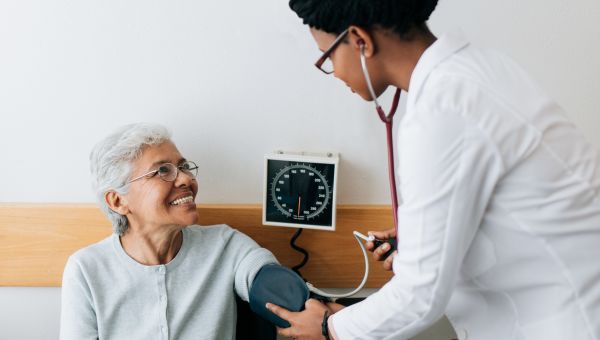7 Stroke Risk Factors Women Should Know
Roughly 55,000 more women than men have strokes each year. Learn the reasons why—and what you can do to reduce your risk.
Updated on January 22, 2024

Not only do women have a higher lifetime risk of stroke, but more women die from strokes each year than men. And while risk factors such as smoking, diabetes, and obesity don’t discriminate between age or sex, some lesser-known risks may be more likely to affect women. Find out your stroke risk as well as ways to reduce your chance of stroke.

Hypertension
Approximately 80 percent of people who have a stroke for the first time also have high blood pressure, also known as hypertension. Rates of high blood pressure tend to be lower in premenopausal women compared to men of roughly the same age. But those numbers shift dramatically as women get older, and particularly after menopause, which occurs on average around age 51. Rates of high blood pressure are higher in women over age 65 than in men of that age group. All told, approximately 75 percent of postmenopausal women have high blood pressure.
Often called a silent killer, high blood pressure has no outward signs or symptoms. That’s why it’s important to get your blood pressure checked at least every year. Hypertension can be controlled—and even eliminated—by practicing heart-healthy habits such as managing your weight, exercising regularly, reducing stress, and eating a healthy diet. In some cases, medications may be required to keep blood pressure levels in check.

Birth Control Pills
Over the years, birth control pills have become safer in terms of their relationship to stroke risk. That said, women who take the pill and have other stroke risk factors may be more likely to have a stroke than those who don’t use oral contraception. “Birth control pills can cause a stroke by triggering a clot in the blood vessel system,” says Phaniraj lyengar, MD, stroke program director at Tristar Centennial Medical Center in Nashville, Tennessee.
The overall risk is small, however. At most, around 10 in 10,000 people on hormonal birth control containing estrogen develop a clot. That’s lower than the chances of developing a clot as a result of pregnancy and not much higher than the risk of developing a clot if you’re not taking the pill at all (a risk of roughly 1 to 5 people out of 10,000 per year).
Talk to your healthcare provider (HCP) about what forms of birth control to take, given your health profile and risk factors. For example, you may need to avoid using combination pills (those containing the hormones estrogen and progestin) if you’ve had a heart attack, stroke, blood clots, high blood pressure, diabetes, liver disease or breast cancer, or if you smoke. If you experience migraine headaches with aura, you’ll likely also need to skip combination pills.
Pills containing progestin only may be recommended for people who shouldn’t use combination pills. But people with breast cancer and certain types of lupus may be advised to avoid progestin-only pills. Your HCP can guide you on what forms of contraception—whether non-estrogen or non-hormonal—would be best for you.

Pregnancy and Preeclampsia
If you’re pregnant, your chance of having a stroke is roughly three times higher than it would be if you weren’t pregnant. The overall chance, however, is still pretty slim, as stroke affects only about 3 out of 10,000 pregnant people in the U.S. each year. (If a stroke were to occur, the likeliest times are the third trimester and the first 12 weeks after delivery.)
Preeclampsia, or high blood pressure that occurs during pregnancy, can increase your risk for stroke during pregnancy or shortly after giving birth. Women with high blood pressure before pregnancy or who had it during a previous pregnancy should talk to an HCP about taking low-dose aspirin to lower stroke risk; it’s recommended from 12 weeks through delivery for people at high risk of preeclampsia.
Certain women may need to take medications to lower blood pressure, as well. If you have a history of preeclampsia, you’ll need to stay in close contact with your HCP about being regularly screened—and treated, if necessary—for heart risk factors such as high blood pressure, high cholesterol, obesity, and smoking. Other risk factors for stroke during pregnancy include gestational diabetes (marked by high blood sugar levels during pregnancy) and blood clots (which may be more likely to form during pregnancy).

Menopausal Hormone Therapy
Using menopausal hormone therapy (MHT) may slightly increase the odds of stroke in some women, as it can boost the risk of blood clots. But MHT is still the leading way to treat menopause symptoms, and its benefits may outweigh the risks for most women who haven’t yet turned 60 or who are within 10 years of menopause.
Currently, most experts say it’s safe to take the lowest effective dose of MHT for short-term therapy. Talk to your HCP to find out if it’s safe for you and what form of treatment might make the most sense. Certain forms of MHT—such as patches, sprays, or rings—may pose less stroke risk than pills taken by mouth.

Soda
It’s well known that drinking sugary soda can lead to weight gain, diabetes, hypertension, high cholesterol, and even heart disease. And some research has found a link between daily consumption of sweetened soda and an increased risk of stroke.
Even diet soda may elevate the risk of stroke. A 2019 study published in the journal Stroke found that among almost 82,000 women, those who drank two or more artificially sweetened beverages (such as diet soda or diet fruit drinks) daily had a 23 percent higher risk of stroke than those who rarely or never drank them.
Swap your soda for an unsweetened alternative like sparkling water with a spritz of fresh lime or iced tea.

Migraine with Aura
“Women tend to have higher rates of migraines, which can increase stroke risk,” says Lori Noorollah, MD, a neurologist in Independence, Missouri. The risk is elevated if the migraine is accompanied by an aura, which may involve a visual disturbance, a pins and needles sensation, and/or numbness. If you have migraines with aura, you can help lower your stroke risk by keeping your weight in check, controlling your blood pressure, exercising regularly, and avoiding smoking and vaping.

Atrial Fibrillation
Atrial fibrillation (AFib) is a condition in which the atria (the top chambers of the heart) beat irregularly. People with AFib have up to a five times higher risk of stroke than people without the condition. Research suggests that women may be more likely than men to develop AFib. They also tend to develop AFib later in life than men and are more likely to have a stroke and die because of it.
This may be in part because of inequities in health care. Research suggests that women who have AFib-related strokes may be less likely than men to receive care from specialists. The care they do receive may also be less aggressive. It may also have to do with differences in the electrical and structural features of women’s hearts. For example, the hearts of women with AFib may not pump blood effectively through the body.
“It’s like the edges of a stream or river where the water flow isn’t fast, you can see that it swirls around and becomes more still,” says Charles Joyner, MD, an electrophysiologist in Richmond, Virginia, who treats patients with AFib. When this happens, he explains, the blood can thicken and form a clot, which resides in the upper sections of the heart. “That clot can break free and enter other organs, such as the brain, causing a stroke.”
If you have AFib—or any of these risk factors for stroke—talk with your HCP about ways to manage your condition and lower your risk of complications.

Abramson, Beth L., MD, FACC, et al. Women and Hypertension: Beyond the 2017 Guideline for Prevention, Detection, Evaluation, and Management of High Blood Pressure in Adults. American College of Cardiology. July 27, 2018.
American College of Obstetricians and Gynecologists. Hormone Therapy for Menopause. Last reviewed: August 2022.
American College of Obstetricians and Gynecologists. Progestin-Only Hormonal Birth Control: Pill and Injection. Last updated: January 2023.
American Heart Association. Go Red For Women. Women and Risk of Stroke Infographic. 2023.
American Heart Association. Go Red For Women. Pregnancy and Stroke. Last Reviewed: February 23, 2021.
American Society of Hematology. Blood Clotting Risk Quickly Drops After Stopping Hormonal Contraceptives. November 8, 2023.
American Stroke Association. Women Have a Higher Risk of Stroke. Page last reviewed December 5, 2018.
Bernstein AM, de Koning L, Flint AJ, Rexrode KM, Willett WC. Soda consumption and the risk of stroke in men and women. Am J Clin Nutr. 2012;95(5):1190-1199.
Bushnell CD, Kapral MK. Stroke in Women and Unique Risk Factors. Stroke. 2023;54(2):587-590.
Carlton C, Banks M, Sundararajan S. Oral contraceptives and ischemic stroke risk. Stroke. 2018;49(4):e157-e159.
Centers for Disease Control and Prevention. Facts About Hypertension. Page last reviewed: September 8, 2020.
Centers for Disease Control and Prevention. National Center for Chronic Disease Prevention and Health Promotion (NCCDPHP). Heart Disease and Stroke. Page last reviewed: September 8, 2022.
Centers for Disease Control and Prevention. Women and Stroke. Page last reviewed August 5, 2020.
Cleveland Clinic. What To Know About Birth Control and Blood Clots. April 25, 2022.
Coylewright M, Reckelhoff JF, Ouyang P. Menopause and hypertension: an age-old debate. Hypertension. 2008;51(4):952-959.
Henry Ford Health. AFib Looks Different In Women: What You Should Know. September 3, 2020.
Ko D, Rahman F, Schnabel RB, Yin X, Benjamin EJ, Christophersen IE. Atrial fibrillation in women: epidemiology, pathophysiology, presentation, and prognosis. Nat Rev Cardiol. 2016;13(6):321-332.
Kostopoulou A, Zeljko HM, Bogossian H, et al. Atrial fibrillation-related stroke in women: Evidence and inequalities in epidemiology, mechanisms, clinical presentation, and management. Clin Cardiol. 2020;43(1):14-23.
Løkkegaard E, Nielsen LH, Keiding N. Risk of Stroke With Various Types of Menopausal Hormone Therapies: A National Cohort Study [published correction appears in Stroke. 2018 Mar;49(3):e142]. Stroke. 2017;48(8):2266-2269.
Miller EC, Boehme AK, Chung NT, et al. Aspirin reduces long-term stroke risk in women with prior hypertensive disorders of pregnancy. Neurology. 2019;92(4):e305-e316.
Mossavar-Rahmani Y, Kamensky V, Manson JE, et al. Artificially Sweetened Beverages and Stroke, Coronary Heart Disease, and All-Cause Mortality in the Women's Health Initiative [published correction appears in Stroke. 2019 Jun;50(6):e176]. Stroke. 2019;50(3):555-562.
Mukherjee, Debabrata, MD, FACC. Oral Contraceptives and Ischemic Stroke Risk. American College of Cardiology. March 28, 2018.
National Heart, Lung, and Blood Institute. Stroke During Pregnancy. Last updated on May 26, 2023.
Pothineni NV, Division of Cardiology, University of Arkansas for Medical Sciences, Little Rock, AR. Gender and AF: differences and disparities. US Cardiology Review. 2018;12(2):103.
Rexrode KM, Madsen TE, Yu AYX, Carcel C, Lichtman JH, Miller EC. The Impact of Sex and Gender on Stroke. Circ Res. 2022;130(4):512-528.
Siddiqi HK, Vinayagamoorthy M, Gencer B, et al. Sex Differences in Atrial Fibrillation Risk: The VITAL Rhythm Study [published correction appears in JAMA Cardiol. 2022 Oct 1;7(10):1082]. JAMA Cardiol. 2022;7(10):1027-1035.
U.S. Preventive Services Task Force. Final Recommendation Statement. Aspirin Use to Prevent Preeclampsia and Related Morbidity and Mortality: Preventive Medication. September 28, 2021.
More On


video

article


video


video


video
